
Бесплатный фрагмент - Russian language for crazy
Tutorial
From the author
Many foreigners who wish to learn Russian encounter the problem of searching a good textbook. To my mind, the textbooks that I had during my college years were very complicated and confusing to study Russian. Using them to learn Russian could be compared to my learning English at school for 6 years and at college for 2 years — I spent 8 years studying English, but I can say only a couple phrases for sure and one of them is “My name is Tatyana”. That’s pretty much all my knowledge of English. However, I have grade “A” in English in my college certificate. Possibly there are good textbooks to learn Russian but I haven’t met them yet.
What are the major differences characterizing my textbook? First, there is nothing more than necessary material, for example, phonetic exercises are excluded. Nowadays there are numerous websites that will teach you to read in Russian and help you with pronunciation.
Unlikely you will get rid of accent so don’t put too much effort in it. While speaking Russian with native speakers you will catch up in correct pronunciation. Second, you are going to study Russian grammar from the very first lesson even before you start speaking Russian. While studying this textbook you will learn the way of using tenses in Russian, correlation between verbal aspect and tense and understanding the cases of nouns or pronouns in relation to the verb.
There is a lot of tables in the textbook which will help you in studying language.
One more moment to which I’d like to pay your attention. There are phenomena in each language which are very difficult to explain. Sometimes native speakers don’t know why they speak so, instead of differently. Therefore the certain words and expressions are easier to learn and not to puzzle your brains why they are used so.
Why does the textbook have such strange title? The matter is that the people, wishing to learn Russian, seem a little bit crazy. Now when Russia is under the sanctions, when economy is in crisis, the idea of studying Russian is not the best somehow. But I am precisely assured that to speak Russian (as well as any other language however) is fine! And if you arrive to Russia sometime, find friends here
(the Russian friend — that’s cool!) and speak Russian with them by means of my textbook I shall be very glad.
Certainly, it would be quite good if someone helped you to study language, but nobody cancelled motivation-power. There would be a desire as Russians like to say.
Алфавит
А (a) Б (b) В (v) Г (g) Д (d) Е (jе) Ё (jo) Ж (ž) З (z) И (i) Й (j) К (k) Л (l) М (m) Н (n) О (о) П (p) Р (r) С (s) Т (t) У (u) Ф (f) Х (h) Ц (c) Ч (ch) Ш (sh) Щ (shch) Ъ ы (y) ь Э (e) Ю (ju) Я (ja)
Learning to read in Russian is not very difficult. We can say — it’s the easiest thing in Russian. Just put the sounds one by one. For example, мама (mama), идти (idti), знаю (znaju), купить (kupit’). Note the letter Ь, which softens the preceding consonant, but does not make sound itself. Therefore, at the end of the word “купить” it should be pronounced soft sound (T”). In the Internet (or in the You Tube) you can find a program and video that will teach you to read in Russian.
The Terms
To learn foreign language, it is necessary to know the basic terms. Without them training is impossible. (Certainly, if you live in the Russian-speaking environment, communicate in Russian every day, it will not be a controlling factor). For those who has no such conditions, without terms it is impossible in any way.
The Gender (masculine, feminine, neuter)
The Stem
The Number (singular, plural)
The Ending
The Tense (the Past, the Present, the Future)
The Verbal aspect (imperfective, perfective)
The Infinitive
The Imperative mood (imperative)
The Case
The Subject
The Predicate
The Comparative degree
The Part of speech (a noun, an adjective, a verb, a pronoun, an adverb, the numeral, a participle, a preposition, a conjunction)
The Synonym
The Antonym
The Sound (soft, hard, unvoiced, voiced)
The Letter (vowel, consonant)
The Sentence
The Accent
The Conjugation
The Greeting and Farewell in Russian
The basic greetings in Russian:
Здравствуйте! (=zdrastvuyte) До свидания! (= do svidaniya) are used are used when addressed to strangers.
Привет! (=privet) Пока! (= poka) До завтра! (=do savtra)
До встречи! (=do fstrechi) — is used when addressed to friends.
The Introducing
— Как… зовут? (What is….name?) — Меня зовут Татьяна. (My name is Tatyana) — Очень приятно. (Nice to meet you). — Меня зовут … (My name is ……)
When this question is addressed to you, it contains the pronoun ВАС, in a reply ВАС is replaced by the pronoun МЕНЯ. When you want to know the name of another person, you should ask: — Как ЕГО (ЕЁ, ИХ) зовут? In a reply the pronoun doesn’t change:
Как его зовут? (What is his name?) — ЕГО зовут Иван. (HIS name is Ivan).
Как её зовут? (What is her name?) — ЕЁ зовут Оля. (HER name is Olya).
Как их зовут? (What are their names?) — ИХ зовут Олег и Наташа. (THEIR names are Oleg and Natasha).
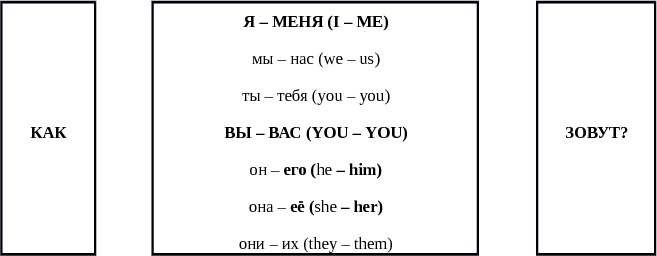
Answer the question:
Как вас зовут? Меня зовут…
Remember, that use of pronouns ты or вы depend on whom you address to.
“Как вас зовут?” You ask when referring to a stranger or to an adult. “Как тебя зовут?” one might ask a child only. For example, it would be indecent to ask an unknown girl: “Как тебя зовут?”. Girls do not beat you, of course, for such question -), but it is better not to ask so.
The Gender of Nouns
There are 3 genders of nouns in Russian. First they are should be learnt. The gender of a noun is determined very simply. When a noun ends in -A or -Я, then it is feminine. When a noun ends in -О or -Е, then it is neuter. All other nouns are masculine (except of папа, дедушка, дядя). Why do we need to know the gender of this or that noun? Noun’s ending varies in six cases in Russian — ((. And it doesn’t just vary, but varies in relation to the gender. Therefore, it is important to know the gender of a noun. It determines the choice of endings. When you just nominate an object or a person it is case 1 (nominative). In case 1 (nominative) the noun’s ending doesn’t change. For example, you say: Это телефон. Or you can ask: Это принтер? Это цветок?
When you want to know how an object is called in Russian, the correct question is: “Как это называется по-русски?” In reply you will hear, for example: “Это собака”.
Masculine gender — Feminine gender –А, -Я — Neuter gender — О, -Ё
он — она — оно
компьютер — девушка — окно
Exercise 1.
(The correct answers (Keys) can be found at the end of the textbook.)
Find the meanings of the words in the dictionary. Define the gender of nouns on the sample.
Sample: Машина — она (she), feminine gender. Телефон — he (он), masculine gender. Молоко — it (оно), neuter gender.
Сестра, брат, машина, скайп, интернет, компьютер, телевизор, собака, окно, молоко, паспорт, виза, кошка, ручка, туалет, пиво, Япония, Китай, Россия, университет.
The gender of a noun determines the choice of a pronoun which it refers to, such as мой (masculine gender), моя (feminine gender), моё (neutral gender), мои (plural). For example, it is wrong to say: Это мой жена. The noun “жена” is of feminine gender, therefore, you must choose the pronoun “моя”. And then the correct answer is: Это моя жена.
Compare correct and incorrect answers in the table below:
Это моя сестра. — правильно. Это мой сестра. — неправильно.
Это мой брат. — правильно. Это моя брат. — неправильно.
Это моя машина. — правильно. Это моё машина. — неправильно.
Это мой собака. — неправильно. Это моя собака. — правильно.
Это мой дети. — неправильно. Это мои дети. — правильно. (Plural noun)
Это мой компьютер. — правильно. Это моя компьютер. – неправильно.
Это мой друзья. — неправильно. Это мои друзья. — правильно.
The Singular and Plural Nouns
For the nouns of masculine and feminine. When the stem ends in К, Г, Х, Ш, Щ, Ж, Ч or a word ends in –Ь, the ending is И. When it ends in other letters, the ending is — Ы. For example, машиНа — машинЫ, книГа — книгИ, стоЛ — столЫ
The nouns of neutral gender in plural have endings –А, — Я
For example, окно — окнА, яйцо –яйцА
Some nouns form plural number in other way. These words you have to memorize!
Дерево (1) — деревья (many)
Ребёнок — дети
Друг — друзья
Учитель — учителя
Дом — дома
Человек — люди
Глаз — глаза
Город — города
Exercise 2.
Find the meanings of the words in the dictionary. Make on the sample. Sample: книга — книгИ
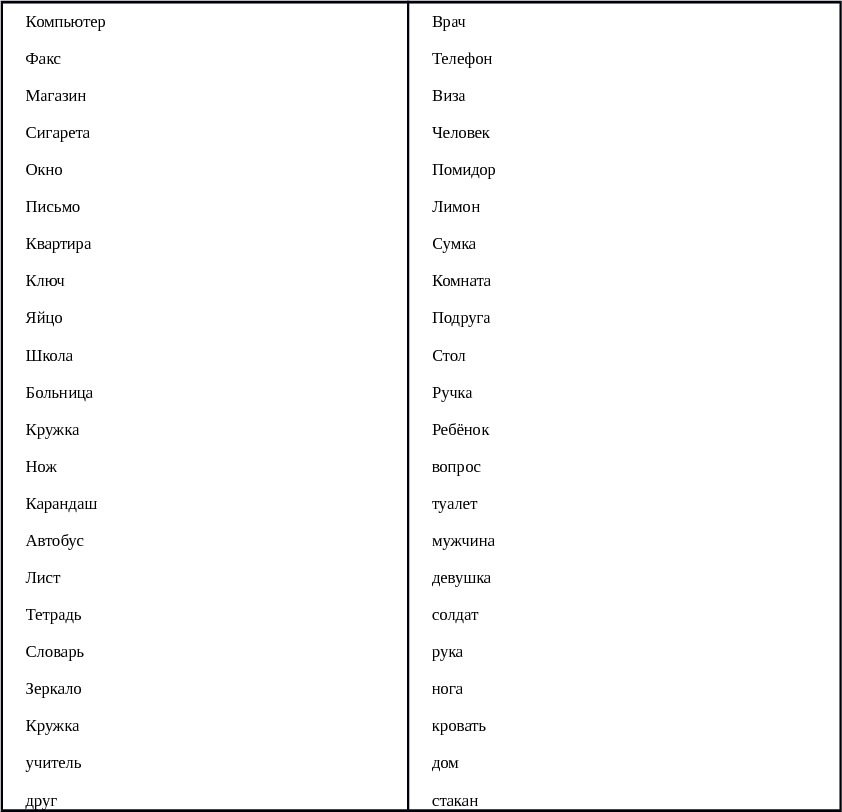
The Model — У вас есть..? =Do you have…?
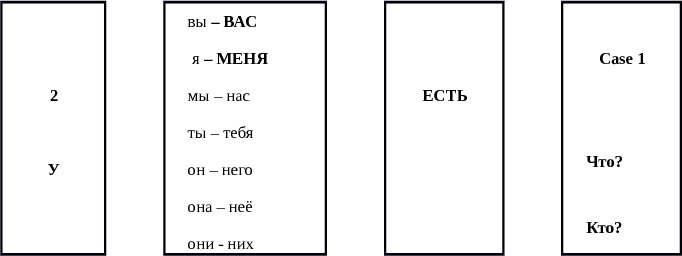
Note that in case of positive answer to the question the ending of a noun does not change: – У вас есть машина? (Do you have a car?) — У меня есть машина (I have a car). The only difference is that “У вас…” has changed to “У меня…”
Exercise 3.
Give the positive answer to the questions:
1. У вас есть ручка? У меня…
2. У вас есть телефон?
3. У вас есть компьютер?
4. У вас есть паспорт?
5. У вас есть электронная почта? (=e-mail)
At the negative answer the noun’s ending changes. It depends on the gender of a noun. You can look changes of endings in the table.
Compare: У меня есть брат. (I have a brother). — У меня нет брата. (I have no brother). In the first sentence you answer positively to the question. The ending of the word “брат” does not change. In the second sentence the ending of the word “брат” has changed. As the word “брат” is of masculine gender, so the ending changes to –А. У меня нет братА. Remember that when you use the word “нет”, the ending of a noun is always changing! We cannot say: У меня нет брат.
Compare the sentences: У меня есть сестра. (I have a sister). — У меня нет сестры. (I have no sister). In the first sentence the ending of the word “сестра” does not change, as the answer is positive. In the second sentence the ending of the word “сестра” has changed from –А to –Ы, as the word “сестра” is of feminine gender. Thus, in the model “У меня нет…” an ending of a noun changes in relation to a noun’s gender.
The Model — У меня нет… =I have no…

If you notice, there are 2 endings in masculine and feminine genders. There is a question what to choose –Ы or –И, — А or -Я? When the stem of a noun of masculine gender ends in a hard consonant, then the ending is — А. When the stem of a noun of masculine gender ends in a soft consonant, then the ending is – Я. (Memorize: ЧА, ЩА are written with А!)
When the stem of a noun of feminine gender ends in a soft consonant or in К, Г, Х, Ш, Щ, Ж, then the ending is И. When it ends in other letters, then the ending is — Ы. However, it doesn’t matter, if you replace –А with –Я, and –Ы with –И, it won’t be very noticeable when pronounced-)! The MAIN THING, that you should memorize: in case of positive answer to the question in the model “У вас есть..?” the ending of a noun does not change. At the negative answer the noun’s ending ALWAYS changes. It depends on the gender of a noun. Noun’s ending varies in six cases in Russian. So, at the positive answer we use case 1 (the nominative form, the noun’s ending doesn’t change), at the negative answer we use case 2 (the noun’s ending changes to the second ending in relation to the gender of noun).
Answer the questions, using the tables. Don’t forget to change endings of nouns at the negative answers.
У вас есть брат?
У вас есть сестра?
У вас есть скайп?
У вас есть работа?
У вас есть кошка?
У вас есть собака?
У вас есть машина?
У вас есть вацап (=Whatsapp)?
У вас есть ноутбук?
У вас есть факс?
У вас есть мечта?
У вас есть телевизор?
У вас есть принтер?
У вас есть велосипед?
У вас есть словарь?
Only pronoun changes at the positive answer: У меня… The ending of a noun does not change.
Correct answers at the negative answer: (НЕТ + брата, сестры, скайпа, работы, кошки, собаки, машины, вацапа, ноутбука, факса, мечты, телевизора, принтера, велосипеда, словаря).
Memorize!
есть деньги — нет денег, есть проблемы — нет проблем, есть время — нет времени
The Past Tense, the Present Tense, the Future Tense
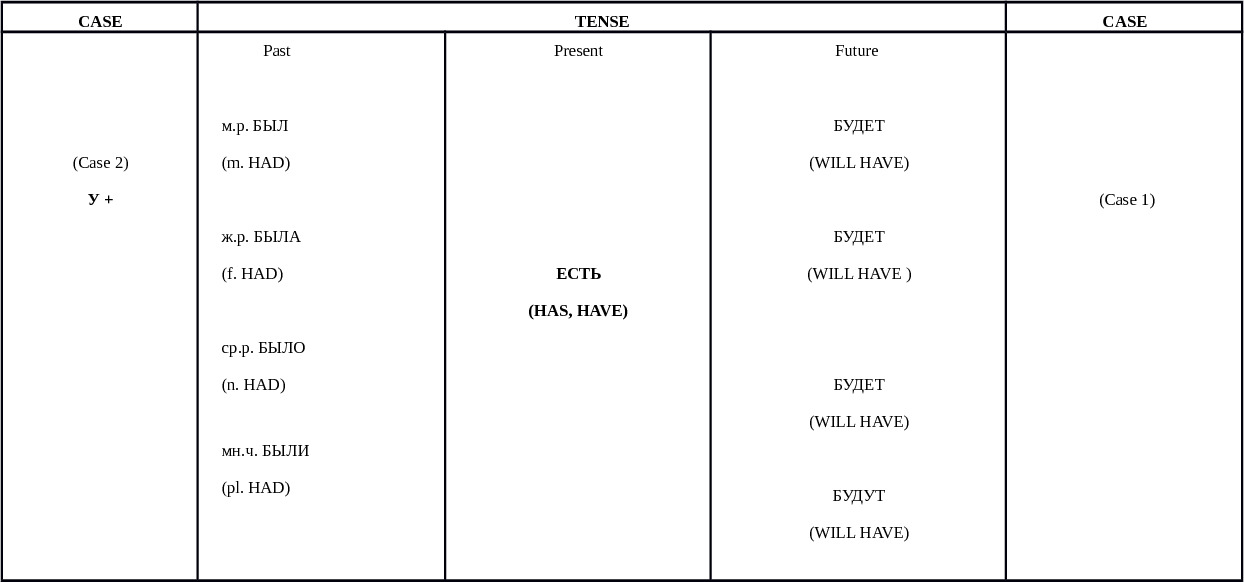

Let’s talk about the Tense. Models: У меня есть… У меня нет… are in the Present Tense.
When we want to say about that we once had, we use a verb in the Past Tense. For example: У меня есть собака. (I have a dog.) — the Present Tense. У меня была собака. (I had a dog.) — the Past Tense. In the Past Tense the endings of verbs change in relation to noun’s gender and number.
Compare:
У меня есть шанс. (I have a chance.) У меня есть работа. (I have a job.) Я меня есть пианино. (I have a piano.) У меня есть деньги. (I have money.). — the Present Tense.
У меня был шанс. (I had a chance.) — м.р. (m.). У меня былА работА. (I had a job.) — ж.р. (f.). У меня былО пианинО. (I had a piano).– ср. р. (n.). У меня былИ деньгИ. (I had money) — plural. — the Past Tense.
У меня будет шанс. (I’ll have a chance). У меня будет работа. (I’ll have a job). У меня будет пианино. (I’ll have a piano). У меня будут деньги (I’ll have money). (plural). — the Future Tense.
All examples are for a positive answer. Don’t forget, that the verb БЫТЬ change only.
At the negative answer the verb БЫТЬ change only, the noun’s endings remain unchanged (-А, -Я, -Ы, -И)
Exercise 4.
Make on the sample:
У меня нет работы. — У меня не было работы. — У меня не будет работы.
У меня есть работа. — У меня была работа. — У меня будет работа.
1. У него есть телефон. —
2. У меня есть квартира. —
3. У неё есть сестра. —
4. У них есть собаки.-
5. У мамы есть деньги. —
6. У брата есть жена. —
7. У меня нет машины. —
8. У него нет денег. —
9. У меня нет проблем. —
10. У нас нет времени. —
11. У мамы нет работы. —
12. У вас есть словарь?
13. У меня есть возможность (ж.р.).
14. У неё нет факса.
15. У студента нет визы.
The Possessive Pronouns
When you want to know to whom the subject or human belong you use the model ЧЕЙ..? (WHOSE…?)
Depending on the gender and number of a noun you choose Чей это …? Чья это..? Чьё это…? or Чьи это..? For example, Чья это машина? (Whose is this car?) (машина is of feminine gender so we use ЧЬЯ), Чей это телефон? (Whose is this phone?) (телефон is of masculine gender so we use ЧЕЙ) Чьё это пальто? (neuter gender) Чьи это деньги? (Whose is this money?) (plural). In the table above you can find the correct answers to questions that begin with ЧЕЙ? ЧЬЯ? ЧЬЁ? ЧЬИ?

When an object (or a person) is your property (belongs to you), choose the answer: Это моя машина. Это мой телефон. Это мои дети. Это моё пальто. Pay attention, that pronoun changes in relation to the noun’s gender and number. Это мой машина — incorrect answer. Машина — feminine gender. So, the correct answer is Это моя машина.
Exercise 5.
Make on the sample using the table.
The sample: Чей это словарь? (Whose is this dictionary?) (я). — Это мой словарь. (This is my dictionary).Чей это ключ? (Whose is this key?) (он) — Это его ключ. (This is his key).
1.Чей это карандаш? (он) —
2.Чья это ручка? (я) —
3.Чья это сумка? (она) —
4.Чьи это деньги? (вы) —
5.Чья это куртка? (он) —
6.Чей это ключ? (я) —
7.Чьи это дети? (они) —
8.Чей это словарь? (она) —
9.Чей это телефон? (я) —
10.Чьи это вещи? (они) —
11.Чей это ребёнок? (он) —
12.Чья это ошибка? (я) —
The Numeral
1 — один 2 — два 3 — три 4 — четыре 5 — пять 6 — шесть 7 — семь 8 — восемь 9 — девять
10 — десять 11 — одиннадцать 12 — двенадцать 13 — тринадцать 14 — четырнадцать
15 — пятнадцать 16 — шестнадцать 17 — семнадцать 18 — восемнадцать 19 — девятнадцать
20 — двадцать 30 — тридцать 40 — сорок 50 — пятьдесят 60 — шестьдесят 70 — семьдесят
80 — восемьдесят 90 — девяносто 100 — сто 200 — двести 300 — триста 400 – четыреста
500 — пятьсот 600 — шестьсот 700 — семьсот 800 — восемьсот 900 — девятьсот 1000 — тысяча
Memorize!
1 рубль, доллар, юань, евро
2, 3, 4 рубля, доллара, юаня, евро
5… рублей, долларов, юаней, евро
Одна тысяча
Две, 3, 4 тысячи
5… тысяч
1 миллион
2, 3, 4 миллиона
5… миллионов
As you see from the examples, the endings of the nouns in combination with numerals differ. It depends on what numeral is used: 1 or 2,3,4 or 5 or more. It should be just memorized!
Model Сколько стоит..? =How much is..?
Answer the questions:
Сколько стоит ваш словарь? Мой словарь стоит…
Сколько стоит ваша ручка? Моя ручка стоит…
Сколько стоит ваша сумка? Моя сумка стоит…
Сколько стоит ваша тетрадь? Моя тетрадь стоит…
Сколько стоят ваши часы? Мои часы стоят…
Сколько стоит билет в автобусе? Билет стоит…
Сколько стоит ваш карандаш? Мой карандаш стоит…
Сколько стоит кока-кола? Кока-кола стоит…
Сколько стоит ваш учебник? Мой учебник стоит…
Сколько стоит ваш телефон? Мой телефон стоит…
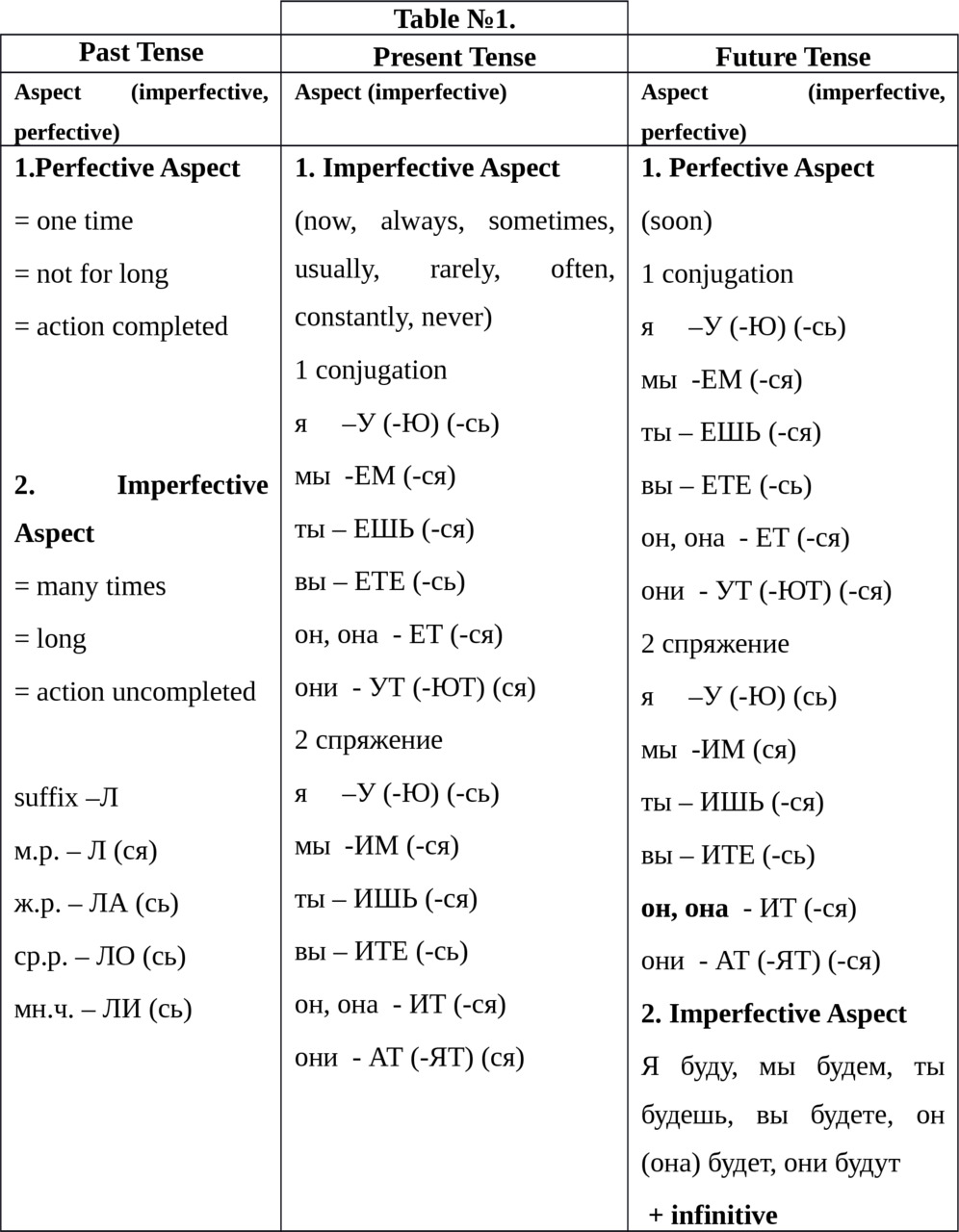
The Formation of the Past Tense of Verbs
The formation of the Past Tense in the Russian language is rather simple. (There are only 3 Tenses: the Past, the Present and the Future).
To form the Past Tense of a verb correctly, you just have to remove -ТЬ and add –Л, -ЛА, -ЛО, -ЛИ, depending on a gender. For example, let’s take the verb “купить”.
To form the Past Tense of the verb, we remove –ТЬ and add Л. Он купил. (He bought.) Она купила. (She bought.) Они купили. (They bought.)
Сказать — он сказал, она сказала, они сказали. (To tell — he told, she told, they told).
When a word ends in –СЯ, -TЬ is removed, but –СЯ remains. For example, учиться — он учился, она училась, они учились. You can see all variants in Table 1!
Exercise 6.
Make on the sample, using Table 1. Find the meanings of the words in the dictionary.
Sample: Писать — Он писал, она писала, они писали. Вернуться — Он вернулся, она вернулась, они вернулись.
Дать —
Учить —
Учиться —
Жить —
Ходить —
Ездить —
Звонить —
Видеть —
Хотеть –-
Работать —
Купить —
Завтракать —
Обедать —
Ужинать —
Гулять —
At the positive answer in the Past Tense you say: Я гулял. Я ужинал. Я звонил. At the negative answer in the Past Tense you just add НЕ. Я не гулял. (I didn’t walk). Я не ужинал. (I didn’t have dinner.) Я не звонил. (I didn’t call.)
Exercise 7.
Give a negative answer. For example: Вы работали сегодня? (Did you work today?) — Я не работал. (I didn’t work.)
1.Вы завтракали сегодня?
2.Вы работали сегодня?
3.Вы гуляли сегодня?
4.Вы учились сегодня?
5.Вы пили сегодня утром сок?
Don’t forget that if you are a woman, you should add –ЛА: Я не работаЛА.
When several persons are mentioned, you should add –ЛИ: Мы не работаЛИ.
As you already know, the Past Tense of verbs in Russian is formed from the verb’s stem by means of the suffix –Л. Some verbs form the Past Tense another way. You should learn these verbs.
For example, the foreigners often say: Он умерел. (from “умереть”) or Он ошибился. (from«ошибиться”). It occurs that automatically –ТЬ is removed and – Л is added. Of course, Russians most likely will understand you, when you say so. But you wish to speak beautifully, don’t you? -)
And how to form the Past Tense of the verbs “умереть” and “ошибиться”, you can find in table 2.
In the table below verbs are grouped by a principle of analogy. First learn the formation of the Past Tense of verbs in column A. Of course, there are more such verbs than you can see in the table. But these ones are enough for the first time. Find the meanings of these verbs in the dictionary or in the end of tutorial.
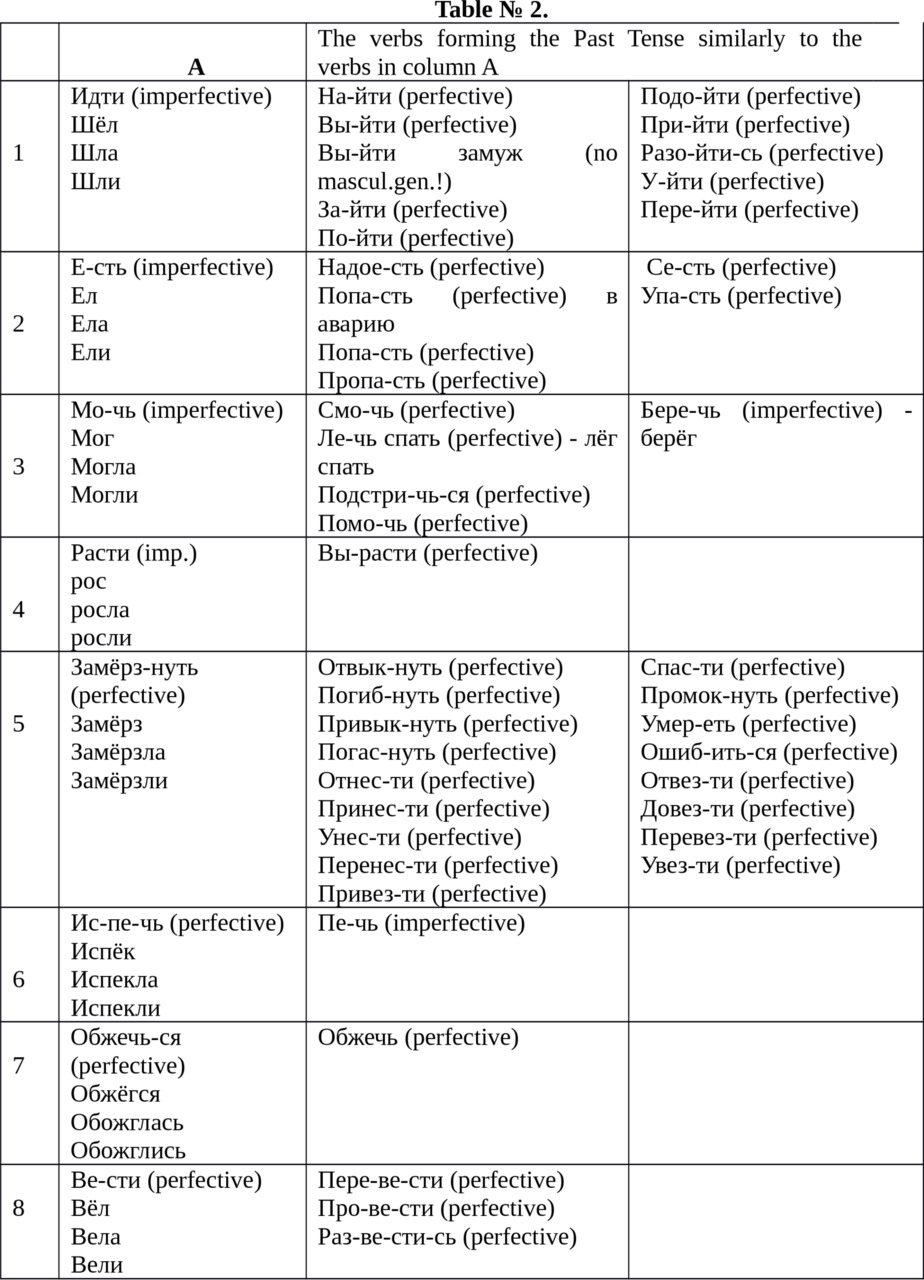
Exercise 8.
Form The Past Tense of the verbs using table 2.
Sample: отвезти — отвёз, отвезла, отвезли.
1.Провести
2.Печь
3.Мочь
4. замёрзнуть
5.Погибнуть
6.Расти
7.Надоесть
8.Разойтись
9.Есть
10.Уйти
11.Отвезти
12.Попасть в аварию
13.Помочь
14.Подстричься
15.Упасть
16.Выйти замуж
17.Погибнуть
18.Развестись
19.Перевести
20.Привыкнуть
THE PRINCIPAL DIFFERENCE OF THE FORM OF THE PAST TENSE IN RUSSIAN IS THAT THE FORM IS NOT DETERMINED BY THE MOMENT OF SPEECH AND THE RESULT OF ACTION. If any action is done even a fraction of a second ago, it is already the Past Tense
There are 2 verbal aspects in Russian: perfective and imperfective. (Further we will denote them abbreviated as (perf.), (imperf)).What is the difference? When an action is taking place once, use the verb of perfective aspect. When an action is taking place several times (repeated), use imperfective aspect. I.e., if you walked to the shop yesterday and bought (once!) a pack of juice, it would properly to say: “Я вчера купил в магазине сок и сигареты. But if you, for example, something bought constantly before, you should say: “Я раньше (часто) покупал мясо”. (“I (often) bought meat before”. ) In this case, an action is taking place several times (repeated), so we use the verb of imperfective aspect.
Or another example. Feel the difference: Я вчера прочитал (с.в.) книгу. — Я читал вчера (н.в.) книгу. (Yesterday I had read (perf.) a book. — Yesterday I read (imperf.) a book.) When “прочитал”, it means till the end. When “читал”, it means that reading is not yet finished. In the first example, the action is completed, in the second one the action has not yet completed.
One more example. Compare: Я договаривался. (I arranged.) (договариваться — н.в.) (to arrange — imperf.) and Я договорился. (I have arranged.) (договориться — с.в.) (to have arranged — perf.). In the first sentence the action has not yet completed as there is no result. In the second sentence the action is completed as there is the result.
The verb “давать — дать” (to give — to have given). Compare: Он дал мне деньги. (He gave me money.) Он давал мне деньги. (He gave me money.) The action is done in the past for both verbs (no matter when). But the difference is that using the verb “дал” the Russians understand that the money was received once. And in the case of using the imperfect aspect “давал”, money was received several times.
Дарить — подарить. (to present with — to have presented with) Read the following sentence and define of what aspect the verb “подарить” is and why? Моя подруга вчера подарила мне часы. (Yesterday my girlfriend presented me with a watch. Let’s speculate! We are talking about yesterday’s event. The girlfriend presented me with a watch once. Therefore, the use of the imperfective verb is inappropriate. We can draw a conclusion that the verb “подарила” is a verb of perfective aspect. And if we take another example: В детстве папа всегда дарил мне цветы на день рождения. (When I was small, my dad always presented me with flowers for my birthday.) We are talking about a repeating event that occur over a period of time. Therefore, the verb of imperfective aspect should be used.
Of course, at the beginning it will be difficult to grasp, what the aspect of a verb to choose to form the Past Tense. But, as you study the language, you will catch in correct using. Just in case, I repeat. In the Past Tense the verbs of perfect aspect are used:
1. Action is taking place 1 time.
2. Action is completed, there is a result.
The verbs of imperfect aspect are used:
1. Action is taking place several times (repeated).
2. Action is not completed, there is no result.
The most important in the formation of the Past Tense is suffix – Л! And, of course, learn the verbs from table 2.
The Present Tense
The Correlation between Tense and Verbal Aspect
As you already understood, at formation of the Past Tense in Russian 2 verbal aspects and suffix-Л are used. What is the correlation between an aspect of a verb and the formation of the Present and the Future Tenses? We’ll talk about this later, but now let’s talk on another point for the beginning. All verbs in Russian in the Present Tense and the Future Tense change their endings depending on pronouns. For example, the verb “знать”. Depending on a pronoun the verb will change: Я знаю. Мы знаем. Ты знаешь. Вы знаете. Он, она знает. Они знают. Another example. Работать — (н.в.). Я работаю. Мы работаем. Ты работаешь. Вы работаете. Он, она работает. Они работают.
And all these changing forms need to learn! (Do you still want to learn Russian? -)). It’s wrong to say: Я работать. Or: Я работаем. When “я”, so, it’s correct to say: Я работаЮ.
The verb “знать” is of imperfective aspect. This means that the phrase “Я знаю” refers to the Present Tense. Why? The fact is that the Present Tense of verbs in Russian is formed from the verbs of imperfective aspect only! Thus, when you want to say about what you’re doing now or about repeated action, you use the verbs of imperfective aspect. To the question “Что ты сейчас делаешь?”, you can answer, for example, Я читаю. (читать — н.в.). Я сплю. (спать — н.в.). Я работаю. (работать — н.в.).
One more example. Я покупаю продукты. (покупать — н.в.). Compare, for example, with the phrase “Я куплю (купить — с.в.) продукты”. The verbs купить-покупать have one and the same meaning and differ in aspects only. While in the first sentence, we are talking about an event that occurs at the present moment (for example, you are in a store and talk on the phone) or about repeated event. The verb “покупать” is of imperfective aspect, it refers to the present tense. The verb “купить” is of perfective aspect, therefore, all forms formed from it, refer to the future tense. For example, when Russian says: “Я куплю машину”, the Future Tense is meant. (You’ll read more about the Future Tense in the next chapter). An example of repeated action, when the verbs of imperfective aspects are used and which refer to the Present Tense, are the following sentences: “Я езжу (ездить – н.в.) на работу на автобусе”. (“I go (to go — imperf.) to work by bus”. ) “Летом часто идут (идти – н.в.) дожди”. (“It rains (to rain — imperf.) often in summer”), « Я часто звоню (звонить — н.в.) домой”. (” I often call (to call — imperf.) home”. ) In table 1 you can see all endings of verbs. Pay your attention, that endings of verbs are different. For example, Он учится (н.в.) — the ending is — ИТ. Он работает (н.в.) — the ending is — ЕТ. The choice between –ит or –ет depends on conjugation (the 1st conjugation predetermines the verb’s ending –ЕТ, the 2nd conjugation predetermines -ИТ). Your brain might blow up from the amount of information that you need to remember. Therefore, in order to make this task easier, at the initial stage the verbs will be given in finished form. The main thing is to change the ending of a verb in relation to pronoun or noun.
The Future Tense
The Future Tense is formed from the verbs of perfective aspect, for example “звонить — позвонить” (to call — shall/will have called). Звонить is the verb of imperfective aspect, so we can form The Present Tense from it only. “Позвонить” is the verb of perfective aspect of the 2nd conjugation, so from this verb we can form only the Future Tense. Я позвоню. Мы позвоним. Ты позвонишь. Вы позвоните. Он, она позвонит. Они позвонят. I.e. when Russian says “Я звоню домой часто”, the Present Tense is meant. But the phrase “Он позвонит мне” means that someone will phone me in future. The endings of the verbs of perfective aspect such as of the verbs of imperfective aspect depend on their conjugation (1st or 2nd).). Я сделаю. Мы сделаем. Ты сделаешь. Вы сделаете. Он, она сделает. Они сделают. See table 1.
So, you should know the aspect of a verb which you use to construct a sentence correctly. When you talk about a future event, you should use a verb of perfective aspect. When you talk about an event which is repeated or is taking place right now, you should use a verb of imperfective aspect.
Conclusions
At forming The Past Tense the verbs of perfective or imperfective aspect are used. At forming The Present Tense the verbs of imperfective aspect are used. At forming The Future Tense the verbs of perfective aspect are used.
The endings in Russian in the Present Tense and the Future Tense vary in relation to pronouns (я, мы, ты, вы, он, она, они) or nouns.
The choose of ending –ЕМ or (-ИМ), -ЕШЬ (-ИШЬ), -ЕТЕ (-ИТЕ), — ЕТ (-ИТ), — ЮТ (-АТ) depends on the conjugations (1st or 2nd).
Sometimes the Future Tense is formed with the help of the verb БЫТЬ + Infinitive (imperfective aspect). For example: Я буду работать. Мы будем работать. Ты будешь работать? Вы будете работать? Он будет работать там? Они будут работать? This variant is used when an event refers to the future or it is long in time (repeated). Я буду звонить часто. (I’ll call often). Я буду любить тебя всю жизнь. (I’ll love you all my life). Я буду учиться. (I’ll study). The forming of the Future Tense in such way is rather rare, than the forming of the Future Tense from the verbs of perfective aspect.
At the end of the textbook you will find the table of all verbs used here, in which verbal aspect is indicated on purpose you to know what Tense can be formed from one or another verb.
Exercise 9.
А) Find the meanings of the words in the dictionary. Define the Tense of the verbs. Learn them!
жить (н.в.) 1 спр. я живу, мы живём, ты живёшь, вы живёте, он, она живёт, они живут.
учиться (н.в.) 2 спр. я учусь, мы учимся, ты учишься, вы учитесь, он, она учится, они учатся.
работать (н.в.) 1 спр. я работаю, мы работаем, ты работаешь, вы работаете, он, она работает, они работают.
говорить (н.в.) 2 спр. я говорю, мы говорим, ты говоришь, вы говорите, он, она говорит, они говорят.
ужинать (н.в.) 1 спр. я ужинаю, мы ужинаем, ты ужинаешь, вы ужинаете, он, она ужинает, они ужинают.
завтракать (н.в.) 1 спр. я завтракаю, мы завтракаем, ты завтракаешь, вы завтракаете, он, она завтракает, они завтракают.
обедать (н.в.) 1 спр. я обедаю, мы обедаем, ты обедаешь, вы обедаете, он, она обедает, они обедают.
покупать (н.в.) 1 спр. я покупаю, мы покупаем, ты покупаешь, вы покупаете, он, она покупает, они покупают.
давать (н.в.) 1 спр. я даю, мы даём, ты даёшь, вы даёте, он, она даёт, они дают.
дать (с.в.) я дам, мы дадим, ты дашь, вы дадите, он, она даст, они дадут.
отдыхать (н.в.) 1 спр. я отдыхаю, мы отдыхаем, ты отдыхаешь, вы отдыхаете, он, она отдыхает, они отдыхают.
Б) Form the Present Tense and the Future Tense on the sample.
Sample: Я … (работать). — Я работаю.
1. Он … (жить).
2. Дети … (работать).
3. — Вы … (завтракать)?
4. — Вы … (учиться)?
5. Ребёнок уже … (говорить)?
6. Я … (ужинать).
7. Родители … (обедать).
8. Я … (покупать).
9. Он … (дать).
10. Он… (давать).
11. — Ты … (отдыхать)? — Нет, я сегодня … (работать).
В) In what sentence a verb of the Future Tense is used? Why?
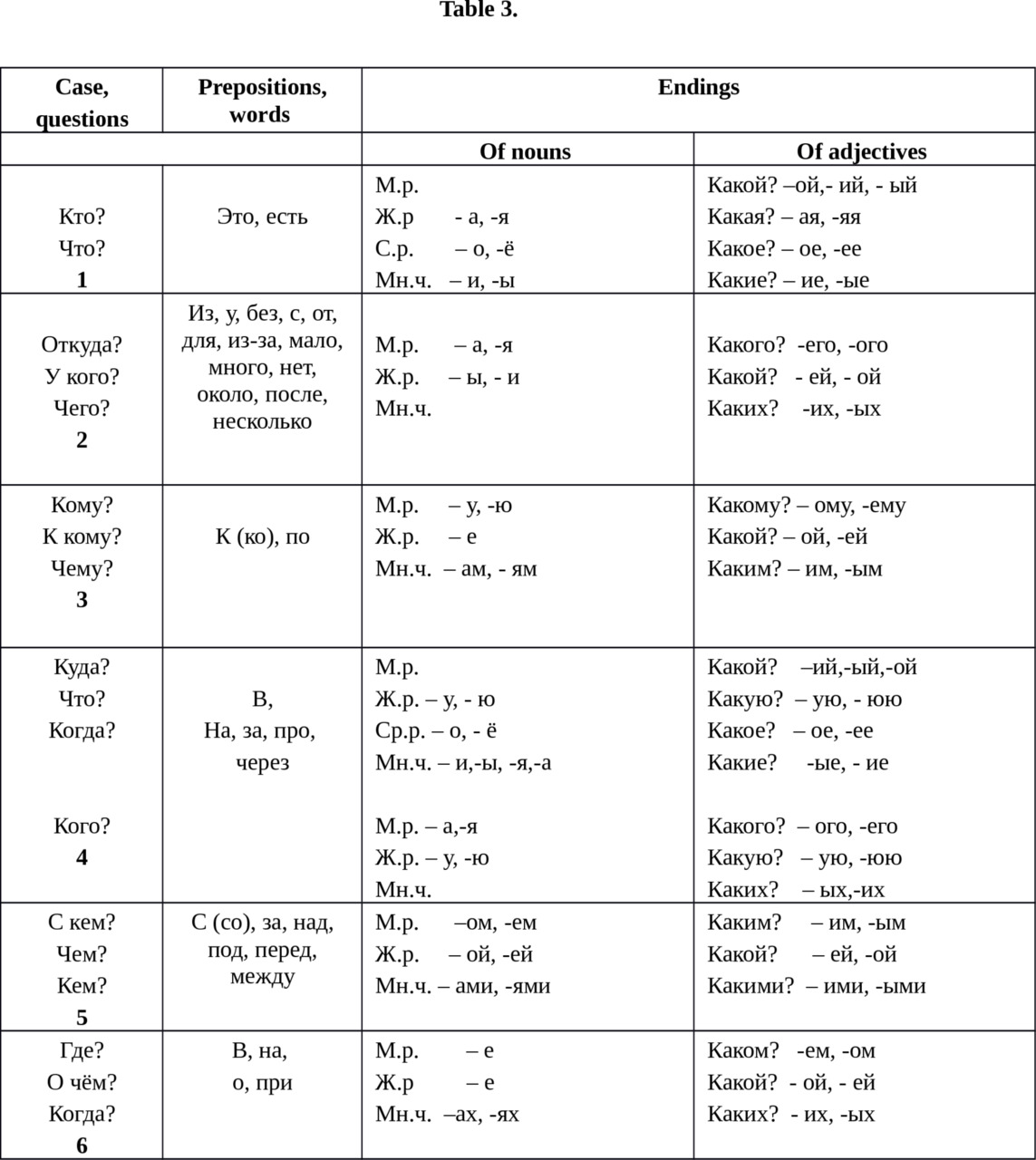
Model — Где..? =Where…? (case 6)
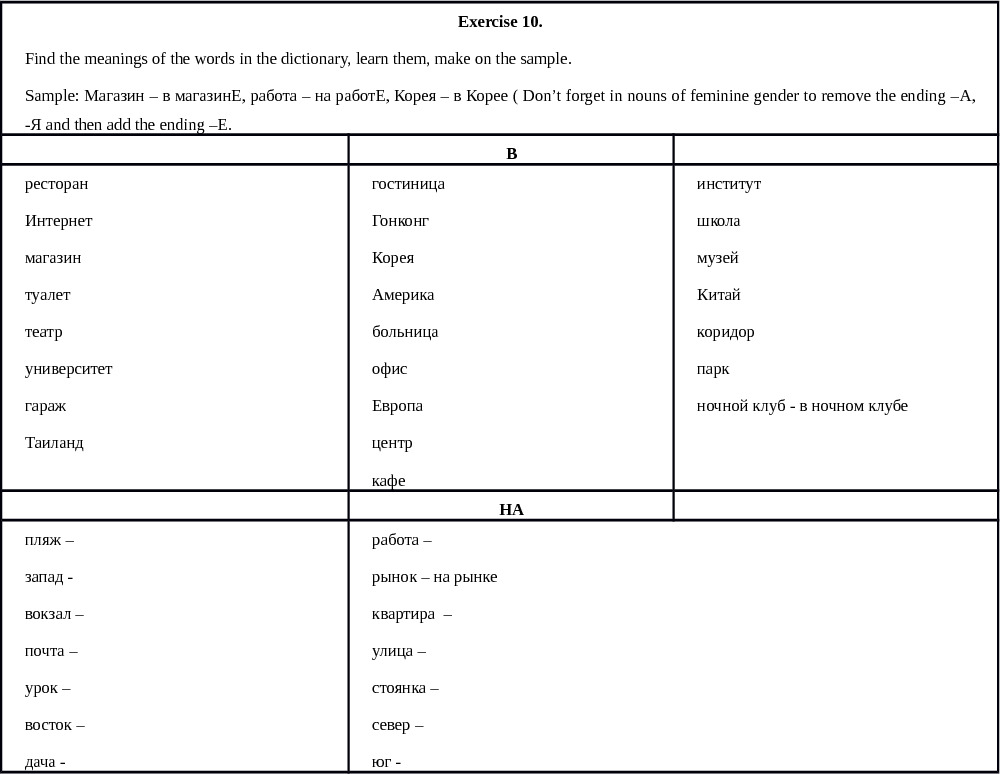
Россия – в России, гости – в гостях, берег – на берегу, аэропорт – в аэропорту, дома, Япония – в Японии, церковь – в церкви, общежитие – в общежитии, компания – в компании, столовая – в столовой.
When Russian asks you a question using the model “Где..?”, and you answer using a noun, you should change a ending of a noun to — Е (it’s case 6) and use the prepositions В or НА. What preposition should be chosen? To make memorizing easier nouns are grouped into 2 groups, depending on the preposition that they are used with.
Just learn-).
For example:
— Где вы работаете? (Where do you work?) — Я работаю в университетЕ. (университет — an university). (I work at the university.)
— Где она работает? (Where does she work?) — Она работает на вокзале. (вокзал — a station). (She works at the station.)
Exercise 11.
А) Insert В or НА:
…берегу, …западе,… Москве, …коридоре, … больнице, …гостинице, … России, …работе, …почте, …рынке, …кино, …музее, …аэропорту, … институте, … юге, … школе, … магазине, … гостях, … вокзале, … туалете, …Японии, … Америке, …церкви, … дома, … ресторане, … общежитии, … Интернете, … компании, ….. Европе….кафе
Memorize: говорить (to speak) + по-русски (Russian), по-английски (English), по-испански (Spanish), по-французски (French), по-китайски (Chinese), по-японски (Japanese), по-немецки (German)
Б) Answer the questions, using in reply the pronoun “Я” and the words in brackets. Note the tense in which verbs are used. (The forming of the Present Tense see in exercise 9. Don’t forget to add –Л or — ЛА, when using the Past Tense).
1.Где вы живёте (Москва)?
2.Где вы жили (Америка)?
3.Где вы учитесь сейчас? (университет)
4.Где вы учились раньше? (школа)
5.Где вы работаете? (компания “Газпром”)
6.Где вы говорите по-русски? (институт)
7.Где вы говорите по-английски? (дома)
8.Где вы покупаете продукты? (магазин)
9.Где вы завтракали сегодня? (кафе)
10.Где вы обедали вчера? (ресторан)
11.Где вы ужинали вчера? (дома)
12.Где вы обычно завтракаете? (столовая)
13.Где вы обычно обедаете? (кафе)
14.Где вы обычно ужинаете? (дома)
15.Где вы отдыхаете? (Таиланд)
В) In what sentences the verbs of the Present Tense is used?
Г) In what sentences the verbs of the Past Tense is used?
Exercise 12.
А) Give a negative answer. Sample: Вы говорите по-русски? (Do you speak Russian?) Я не говорю по-русски. (I don’t speak Russian.) Вы курили сегодня? (Have you smoked today?) Я не курил сегодня. (I haven’t smoked today.)
1.Где вы обедали сегодня?
2.Где вы ужинали вчера?
3.Вы говорите по-китайски?
4.Вы говорите по-японски?
5.Где вы завтракали сегодня?
6.Вы говорите по-испански?
7.Вы учитесь или работаете сейчас?
8.Вы говорите по-немецки?
9.Вы говорите по-английски?
10.Вы учились сегодня?
11.Вы говорите по-русски?
Б) In what sentences the verbs of the Past Tense is used?
In Russian language verbs determine an ending of a noun. You can easily choose a noun’s case, when you are asked a question such as “Где..?” you should choose the ending — Е (case 6) without hesitation. But you will not always be answering only. You will speak-)!
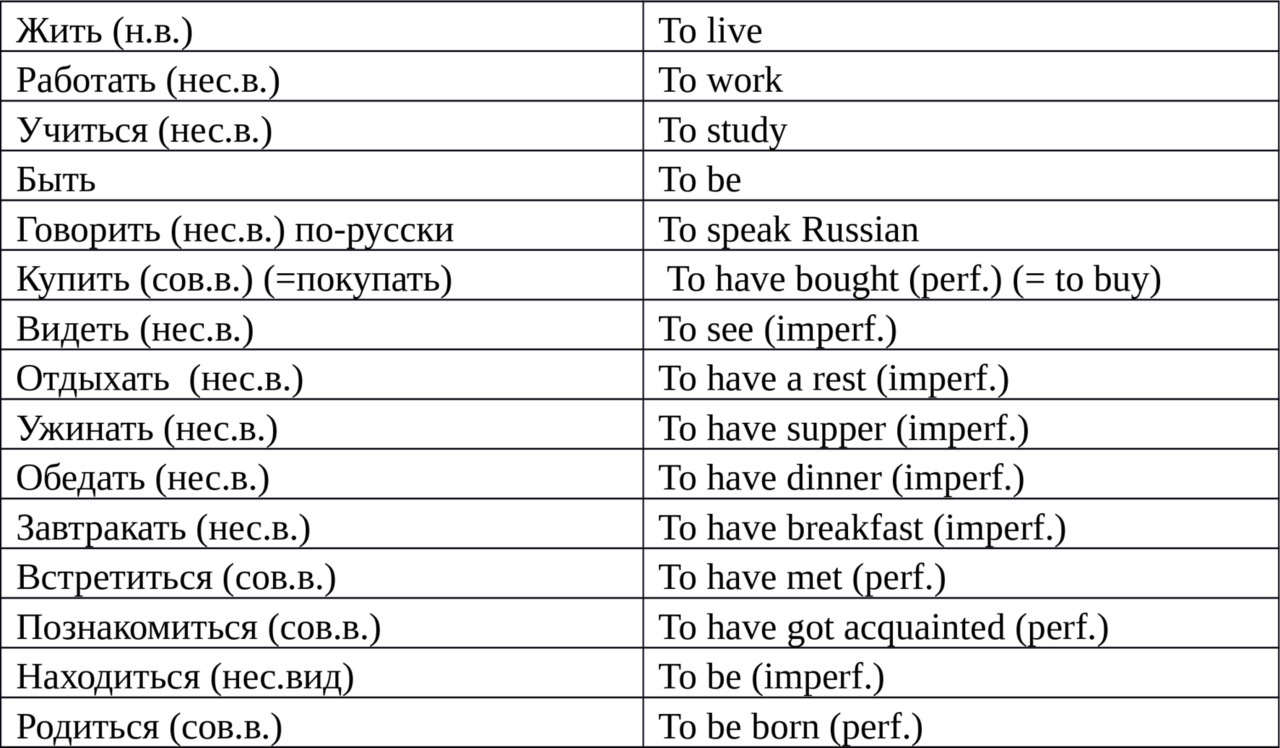
So you want to construct a phrase with one of these verbs. How will it look like? First you define what Tense does an event refer to (Past, Present, Future). For example, you want to say where you had breakfast this morning. The action took place in the past, then you use the verb “завтракать” in the Past Tense. If you are a man, add the suffix – Л: Я завтракал. If you are a woman, add –ЛА: Я завтракала. Then change noun’s ending according to case 6 and use the preposition В or НА. For example, let’s take the noun “гостиница”. Change the ending, add preposition В and it turns out В ГОСТИНИЦЕ. So, we’ve constructed the phrase “Я завтракал сегодня в гостинице”. Another example. If you are having breakfast, and someone phones you at this time and asks what you are doing now, you should answer: “Я завтракаю в гостинице”. In this sentence The Present Tense is used.
Let’s take the verb “отдыхать” for example. After this verb should be used a noun in case 6, noun’s ending changes to –Е. Я + отдыхал (the Past Tense) + a noun in case 6. The phrase Я отдыхал Европа is not correct.
If you have a rest in Europe every year, you should say “Каждый год я отдыхаю в Европе”. (“I have a rest in Europe every year”. )
Or: Я + учился + в Америке, а сейчас учусь (the Present Tense) + в Москве.
Or: Я обычно завтракаю + в кафе, обедаю + в ресторане, а ужинаю + дома. (All verbs are used in the Present Tense). The word “дома” doesn’t change as it is an exception.
Sure, you can use these verbs without nouns, for example: Сегодня я отдыхаю. Я сейчас обедаю. Я не работал вчера.
The Use of the Verb БЫТЬ
One of my students from Japan said that the Japanese never asked the question “Ты где?” This question seems to them indecent, almost the interference in private life. It does not apply to the Russians. The Russians, when talking on the phone, after greeting ask a question “Ты где?” probably in a half of cases. That’s why we study this model one of the first. The advantage is that it is easy to remember noun’s endings. The nouns of feminine an masculine genders change their endings to –Е.

The question “Вы где?” (“Where are you?”) refers to the action taking place in the present. When answering this question, the verb “быть” is missing. For example: — Ты где? — Я на работе. In the Past Tense the suffix –Л is added to the verb. Я был на работе. (masc.gen.). Я была на работе. (fem.gen.). Мы были на работе. (pl.). In the Future Tense the verb changes in relation to a pronoun. For example: Я буду на работе. Ты будешь на работе. Она будет в университете? You can see all variants in table 4. When in a question the verb “быть” is in the Past Tense, you should use the Past Tense in a reply. When in a question the verb “быть” is in the Future Tense, you should use the Future Tense in a reply. For example: — Где ты был? (Where were you?) — Я был дома. (I was at home.) Or: — Где ты будешь завтра утром? (Where will you be tomorrow morning?) — Я буду завтра утром в университете. (I’ll be at the university tomorrow morning.) After the verb “быть” should be used a noun in case 6.
Exercise 13.
Give a negative answer to the questions.
Sample: Вы были в Москве? (Have you been in Moscow?) — Нет, я не был в Москве. (No, I’ve never been in Moscow.)
Вы в Москве сейчас? (Are you in Moscow now?) — Нет, я не в Москве сейчас. (No, I am not in Moscow now.)
1.Вы в Чикаго?
2.Она в Петербурге?
3.Он был в Канаде?
4.Вы были в Пекине?
5.Она дома?
6.Вы были в Токио?
7.Вы были в Москве?
8.Вы будете в университете завтра в 12 часов?
9.Ты здесь?
Exercise 14.
Answer the questions:
1.Где вы сейчас?
2.Где вы будете сегодня через 3 часа?
3.Где вы были вчера вечером?
4.Где вы были вчера утром?
5.Где вы будете завтра утром?
6.Где вы будете сегодня вечером?
7.Вы были в Москве?
8.Вы были в Санкт-Петербурге?
9.Где вы были в воскресенье?
10.Вы были вчера в ресторане?
11.Где вы будете через год?
12.Где вы будете через 10 лет?
А) In what sentences the verb “быть” is used in the Future Tense?
Б) In what sentences the verb “быть” is used in the Past Tense?
В) In what sentences the verb “быть” is used in the Present Tense?
Model — На каком этаже..? =On what floor..? (case 6)
When answering the question: “На каком этаже..?”, your answer implies the use of a preposition НА and the ending –ОМ at numeral. The ending of the noun “этаж” is changed to –Е. When you want to know on what floor someone or something exactly is situated, you should ask: Извините, не подскажете, на каком этаже находится (находиться –н.в.) + … (case 1)? For example: Извините, не подскажете, на каком этаже находится туалет? (Excuse me, could you tell me on what floor is the toilet?) (аптека, касса, магазин, кинотеатр, ресторан)?
Or, for example, you want to meet somebody and phone this person: — Ты на каком этаже сейчас? — Я на втором этаже.
Here is an example of a very common question: — На каком этаже ты живёшь (работаешь, учишься)? (On what floor do you live (do you work, do you study)?) — Я живу на пятом этаже. See on the table p. 56.
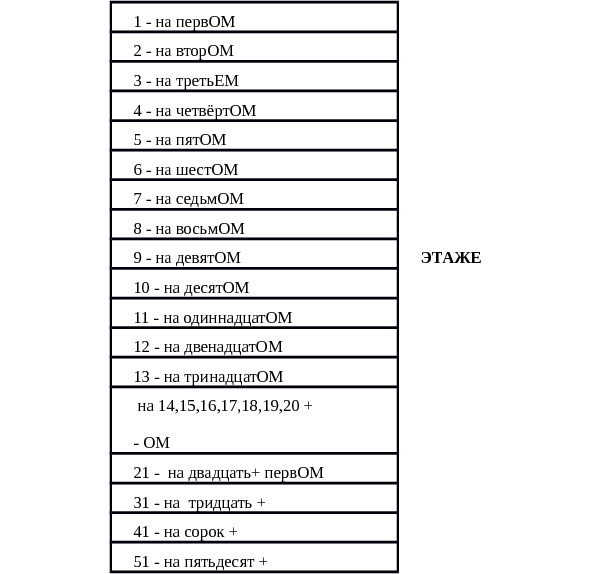
Answer the questions:
На каком этаже вы учитесь? Я учусь на…
На каком этаже вы живёте? Я живу на…
На каком этаже вы работаете? Я работаю на…
На каком этаже вы учились в школе? Я учился на…
Often the model “на… этаже” is used with the following verbs:
Я буду ждать вас = (I will wait you) на… этаже.
Давайте встретимся (Lets meet!) (встретиться — с.в.) на… этаже!
Давайте выпьем (Lets drink) (выпить — с.в.) кофе на… этаже!
— Ты где? — Я на втором этаже!
— Вы на каком этаже сейчас? — Мы на последнем (последний= last) этаже.
Exercise 15.
Write the numerals given in brackets. Sample: Я жду вас … (4). — на четвёртом этаже.
1.Я живу… (1)
2.Я жду … (2)
3.Я учусь … (3)
4.Он живёт … (5)
5.Туалет … (7)
6.Кинотеатр … (8)
7.Давайте встретимся … (9)
8.Он работает … (10)
9.Мы жили … (11)
10.Она была … (3)
11.Они работают … (21)
Model — Какое сегодня число? =What is the date today?
When you suddenly forget-)), what date is today (or yesterday and tomorrow) or your Russian friend forgets it, questions will be following — Какое сегодня число? (What is the date today?) — Какое число было вчера? (What was the date yesterday?) — Какое число будет завтра? (What will be the date tomorrow?)
The numeral’s ending is — ОЕ, when you use the words “вчера”, “сегодня”, “завтра”.
For example: Сегодня пятое мая. — The Present Tense is used.
Вчера было четвёртое мая. — the verb “было” determines the Past Tense.
Завтра будет шестое мая. — the verb “будет” is used in the Future Tense only. See on the table p. 59.
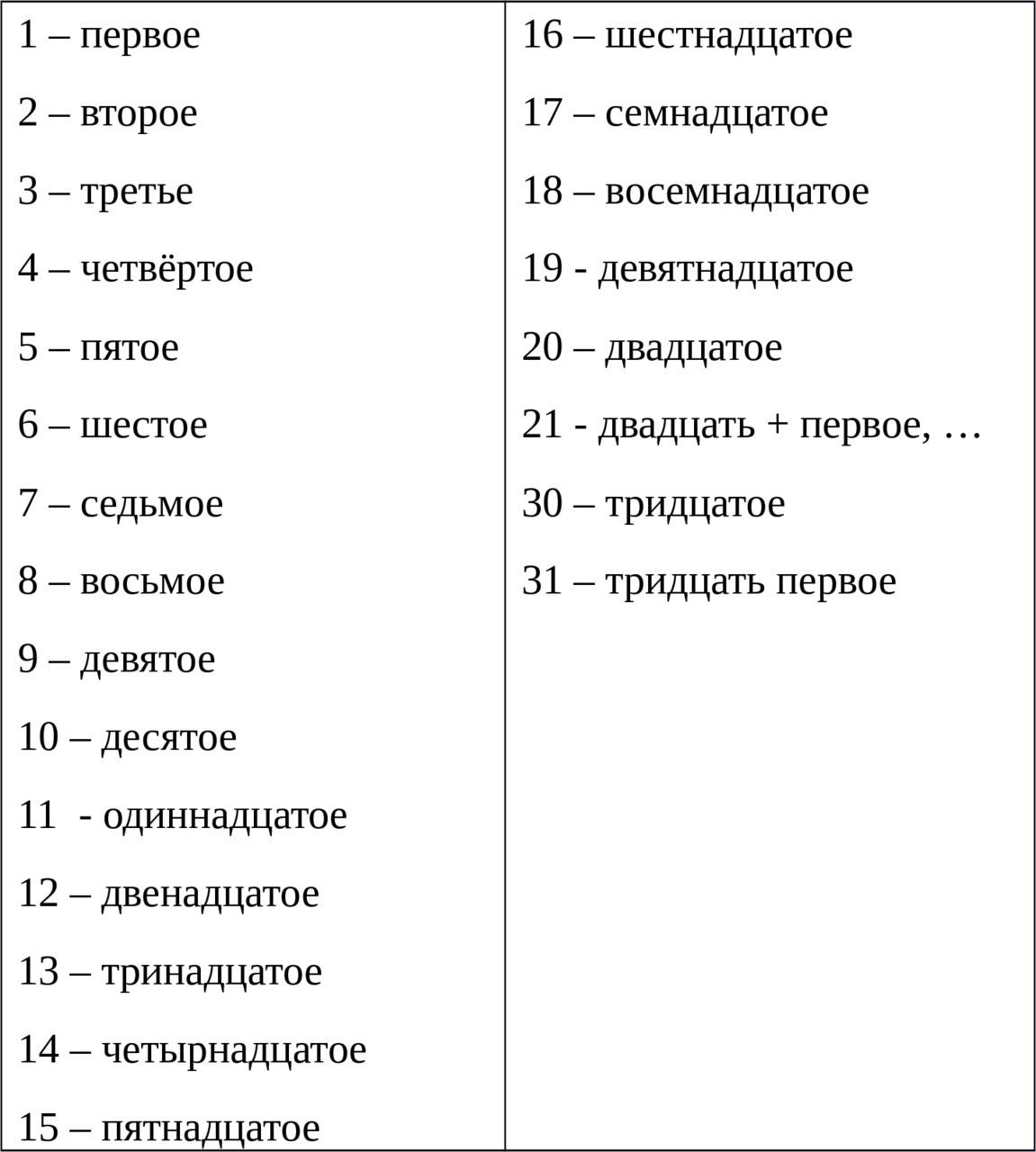
When in a sentence other verbs are used or you answer the question “Какого числа..?” or “Когда..?”, numeral’s ending is changing. For example, in the sentence: Он приехал 5.02., you should say: “Он приехал вторОГО февраля”. “Он приехал второе февраля.”. — Incorrect answer! See on the table p. 60.
To the question: — Какого числа вы приедете? the answer should be: “Я приеду пятОГО марта”. Я приеду пятое марта. — Incorrect answer!
Compare: Сегодня второе июля. — Я приеду второго июля. Or: Завтра будет первое января. — Он уехал домой первого января
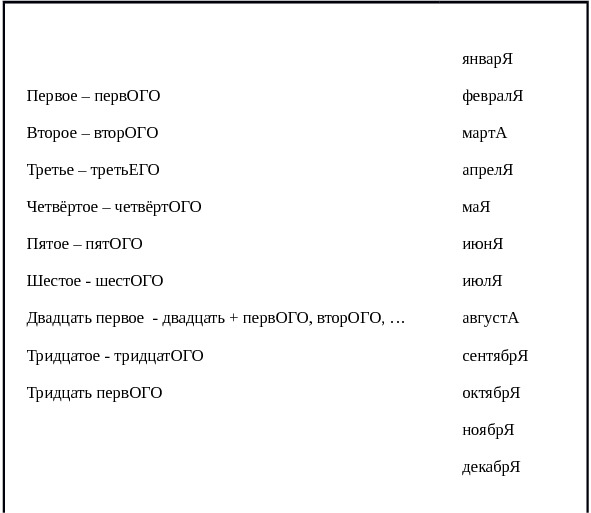
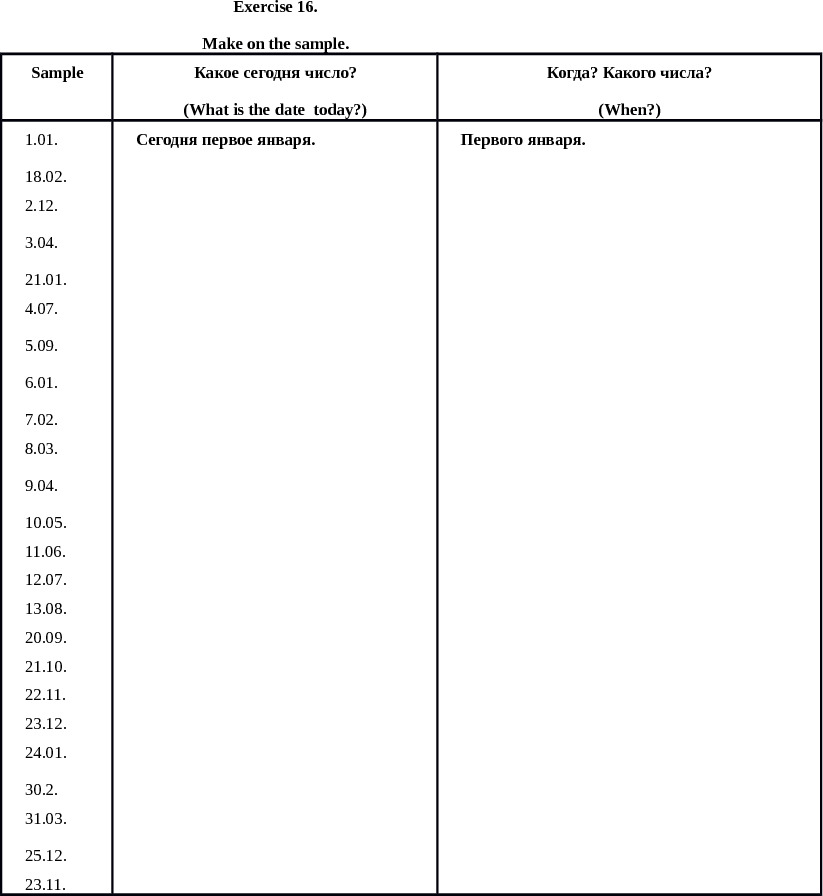
P.S. The numerals with the ending — ОЕ are also used in situations when you need to buy a ticket for any type of transport. You also use the preposition НА. For example, when you buy a ticket, you should say: Мне нужен билет Москва — Петербург на втор-ОЕ марта. (I’d like to book a seat from Moscow to St.-Peterburg on the 2nd of March.)
Answer a question, using the sample.
Sample: У меня день рождения семнадцатого января. (I was born on the 17th of January.)
Когда у вас день рождения? (When were you born?/What date is your birthday?) У меня день рождения…
Days of week
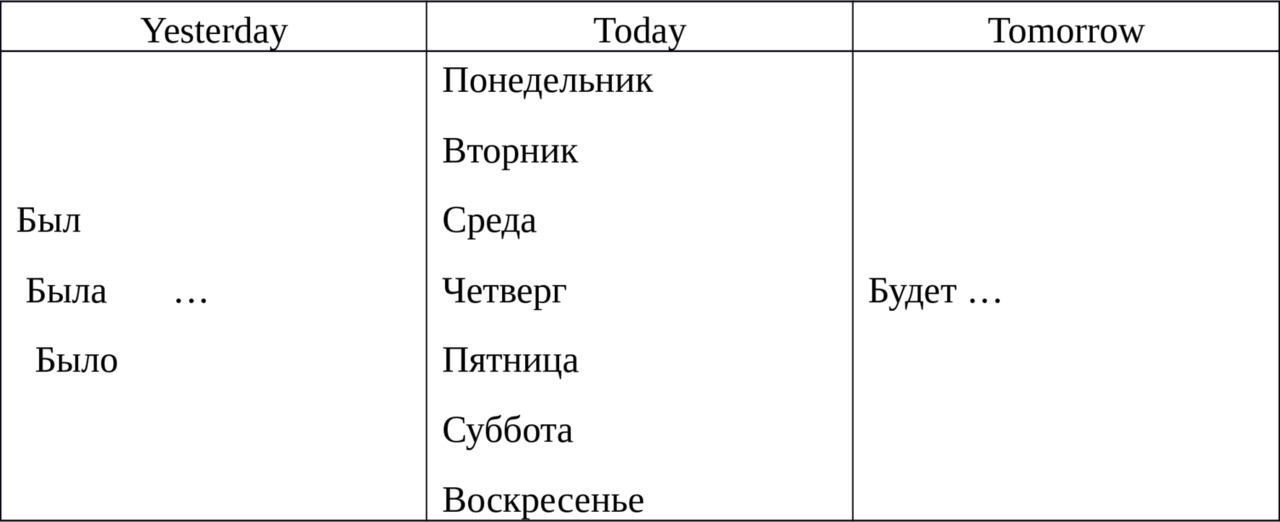
If you get up in the morning and forget not a date)), but what today (today, tomorrow), is a day of week, you should ask someone: Какой сегодня день недели? (What day is it today?) Какой день недели был вчера? (What day was it yesterday?) Какой день недели будет завтра? (What day will it be tomorrow?) Or: Сегодня четверг? (Is it Thursday today?) Завтра суббота? (Will it be Saturday tomorrow?) Вчера был вторник? (Was it Tuesday yesterday?)
For example: Вчера была пятница. Сегодня среда. Завтра будет вторник. Only in these cases days of the week are used without preposition.
When you answer the question “Когда..?” (When…?) or you talk about an event that takes place on a certain day of the week, you add the preposition В (во) and change the endings of the nouns of feminine gender :
В понедельник
Во вторник
В средУ
В четверг
В пятницУ
В субботУ
В воскресенье
For example: — Когда ты вернёшься? — В среду. (When will you be back? — On Wednesday.) Or: Я ходил туда в пятницу. (I went there on Friday.)
When you use any verb in a sentence, you also use the preposition and change a noun’s ending. For example: Они приехали (приехать — с.в.) в среду. Я смотрел (смотреть — н.в.) фильм в субботу.
Compare: Сегодня суббота. Я приехала в субботу.
Exercise 17.
Insert a noun given in brackets with or without preposition.
Sample: Она приехала …………………. (среда). — Она приехала в среду.
1. Какой сегодня день недели? — Сегодня………………….. (понедельник).
2.Я видел (видеть — н.в.) маму …………………… (вторник).
3.Мы ходили (ходить — н.в.) в кино ………………….. (пятница).
4.Я работаю ………………………… (вторник).
5.Завтра …………………. (суббота), поэтому я не работаю.
6. — Когда ты вернёшься? (вернуться – с.в.) — ……………………. (воскресенье).
7. — Вчера был …………………….. (понедельник)? — Нет, ……………………. (вторник).
Answer the questions:
Вы работаете в субботу?
Вы работаете в понедельник?
Сегодня воскресенье?
Завтра понедельник?
Вы отдыхаете в воскресенье?
Models: Я люблю, я могу, я хочу, я собираюсь (I like, I can, I wish, I am going to do smth) + Infinitive
are used in replies to the questions:
— Что вы любите делать? (What do you like to do?) — Что вы можете делать? (What can you do?) — Что вы хотите делать? (What do you want to do?) — Что вы собираетесь делать? (What are you going to do?)
Note that in replies to these questions, the verb “делать” is not needed.
Я хочу делать спать. — Incorrect. Я хочу спать. – Correct.
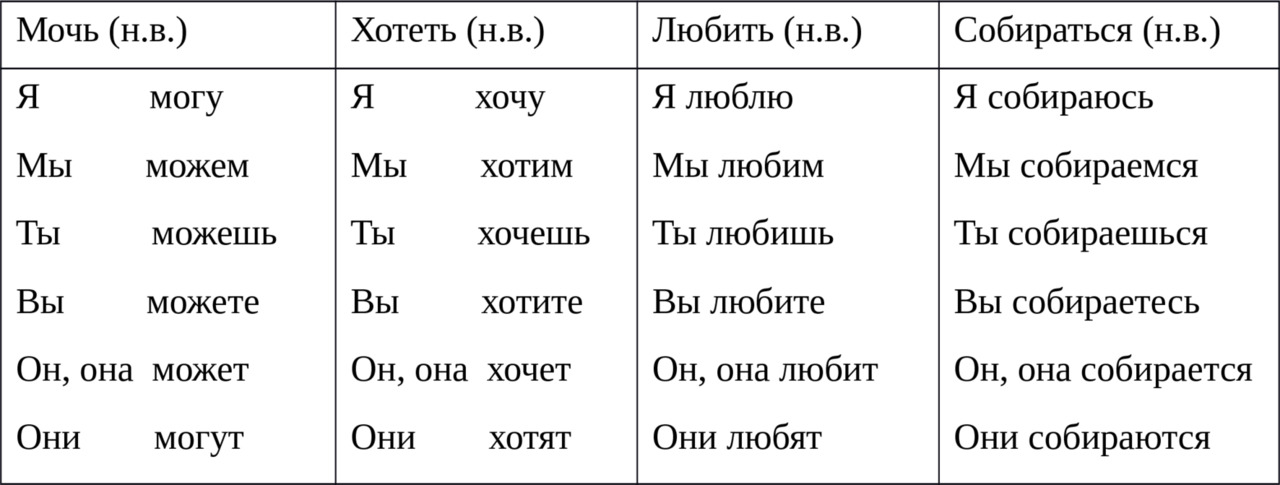
When you want to talk with a Russian-speaking interlocutor about what he likes, can or wants to do, your questions are constructed as follows:
Вы любите (можете, хотите) + Infinitive?
For example:
Вы можете рисовать? (Can you draw?)
Вы любите смотреть футбол? (Do you like to watch football?)
Вы хотите есть? (Do you want to eat?)
Вы хотите спать? (Do you want to sleep?)
Вы любите фотографировать? (Do you like taking photos?)
Вы можете помочь? (Can you help?)
Вы хотите выпить? (Do you want a drink?) (This question implies that you are asking someone if he wants to drink alcohol.)
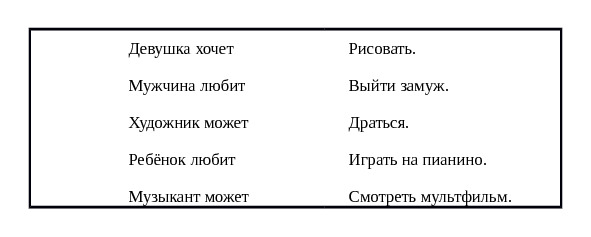
Complete the sentences using the infinitive.
Вы хотите пить? (Do you want to drink?) (When you use the verb “пить”, the question implies that you are asking someone if he wants some water, juice or tea).
Я не люблю…
Женщины любят…
Дети любят…
Мужчины любят…
Я люблю…
Я могу…
Я не могу…
Сейчас я хочу…
Exercise 19.
Give a negative answer to the questions. For example: Я не хочу спать.
1.Вы хотите есть сейчас?
2.Вы любите готовить?
3.Вы хотите говорить по-русски?
4.Вы можете играть в шахматы?
5.Вы можете рисовать?
6.Вы любите танцевать?
7.Вы хотите поехать в Москву?
8.Вы любите ходить в театр?
9.Вы можете играть на пианино?
10.Вы любите пить вино?
11.Вы хотите спать сейчас? (A joke-))
12.Вы любите путешествовать?
13.Вы любите фотографировать?
Model — Куда..? =Where to…? (case 4)
Memorize what nouns require the preposition В, what nouns require the preposition НА!
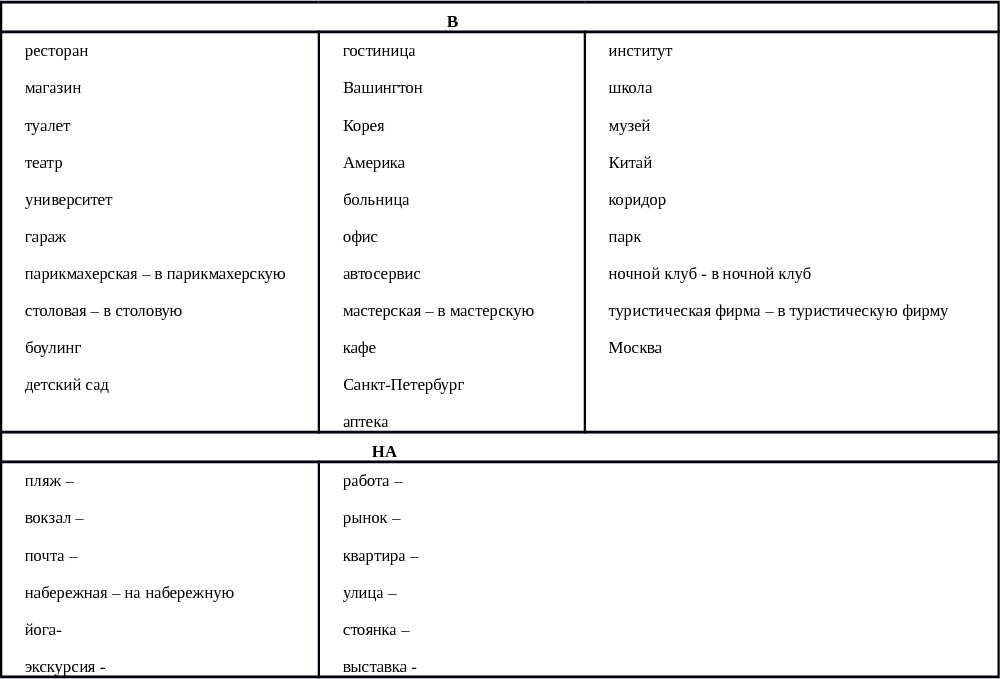
Remember: домой, в церковь, в гости (to visit), никуда не (nowhere) + a verb
Я никуда не ходила вчера. (Yesterday I went nowhere.) Я ходила в церковь вчера. Завтра мы пойдём в гости.
************************************************************
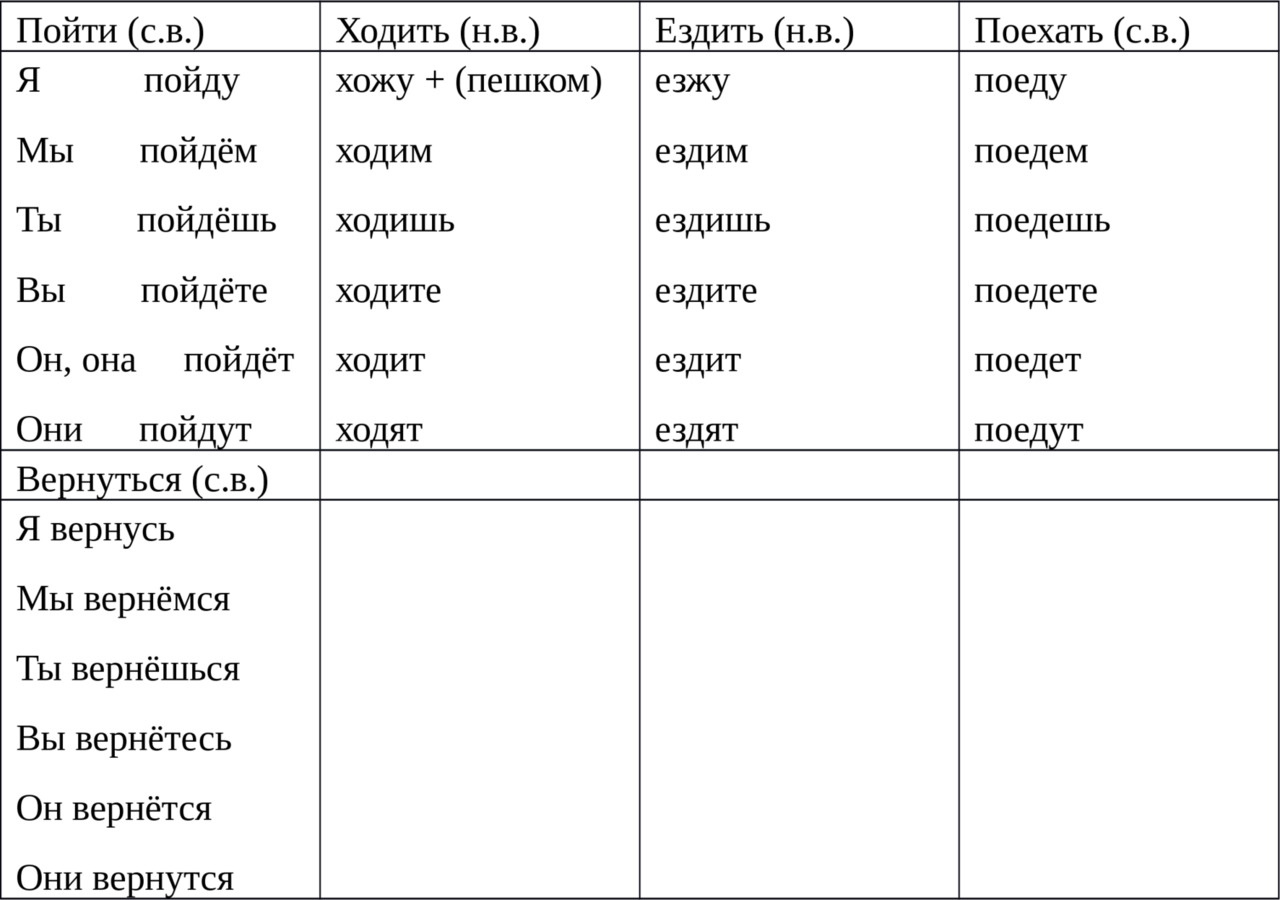
Exercise 21. Insert В or НА: …берег, Москву, …коридор, … больницу, …гостиницу, … Россию, …работу, …почту, …рынок, …кино, …музей, …аэропорт, … институт, … Хабаровск, … школу, … магазин, … гости, … вокзал, … туалет, …Японию, … Америку, …церковь, … домой, … ресторан, … общежитие, …Санкт-Петербург, … мастерскую, … компанию, …автосервис, … парикмахерскую, … туристическую фирму, …кафе, … боулинг, … столовую, … набережную, … парк, … детский сад.
When you answer the question: — Куда..? or when you use the verbs of motion in a sentence, you should put after them a noun in case 4 with the preposition В or НА.
For example: Завтра я поеду (+4) в Москву. Завтра я поеду Москва. – Incorrect!
— Куда ты пойдёшь завтра? — Я пойду (+4) на концерт.

Exercise 22.
А) Make on the sample. Sample: Я езжу каждый день …. (работа). — Я езжу каждый день на работу.
1.Мы ходили вчера… (выставка).
2. — Вы пойдёте завтра … (работа)?
3.Дети ходили вчера … (больница).
4.Скоро я поеду … (Санкт-Петербург).
5. — Вы ходите пешком … (домой)?
6. — Куда дети ходят каждый день? – … (школа)
7. — Куда вы ездили вчера? – … (кино).
8. — Куда вы пойдёте завтра? -… (йога)
9. — Вы ходили вчера … (парикмахерская)?
10. — Вы ходили вчера … (магазин)?
11. — Ваш ребёнок ходит … (школа) или … (детский сад)?
Б) Define the Tense of the verbs in each sentence.
Exercise 23.
Give a negative answer to the questions. Sample: Вы ездите на работу? (Do you drive to the work?) — Я не езжу на работу. (I don’t drive to the work.)
1.Вы ходите в церковь?
2.Вы ходите на йогу?
3.Вы ходите в спортклуб?
4.Вы ходите в театр?
5.Вы ездите на такси?
Exercise 24.
А) Answer the questions using the words in brackets. Sample: Куда ты ходишь? (Where do you go to?) — Я хожу … (йога). – Я хожу на йогу. (I go to the yoga section.)
1.Куда студенты ходят каждый день? (университет)
2.Куда школьники ходят каждый день? (школа)
3.Куда вы любите ходить вечером? (ночной клуб)
4.Куда он ходил сегодня? (работа)
5.Куда вы ходили вчера? (никуда)
6.Куда они уехали? (Прага)
7.Куда она ушла? (домой)
8.Куда мы поедем? (командировка)
9.Куда вы звонили? (Москва)
10.Куда он вернётся? (Россия)
Б) Define, in which sentences the verbs are used in the Present Tense, in the Past Tense, in the Future Tense.
Exercise 25.
А) Make on the sample:
Sample: Я … (ходить) пешком на работу каждый день. — Я хожу пешком на работу каждый день.
1.Завтра я … (поехать) в Москву.
2.Скоро мы … (поехать) в Прагу.
3. — Ты … (ездить) на работу или … (ходить) пешком? — Обычно я хожу пешком.
4.Послезавтра я … (пойти) в театр.
5.Вчера я … (ходить) в ресторан.
6.Мы … (ездить) недавно в Санкт-Петербург.
7. — Ты … (поехать) на такси? — Да, такси уже едет.
8. Я живу далеко, поэтому … (ездить) в университет на автобусе.
9. Позавчера студенты … (ездить) на экскурсию.
Б) Define the Tense of the verbs.
Model — Что..? =What…? (case 4)
When using the model Что..? in Russin a noun is used in case 4 (but without a preposition), so the endings of nouns coincide with those in the model — Куда..?
Memorize the verbs that require a noun in case 4 without a preposition!
Купить (покупать), подарить, дать (взять), любить, продать (продавать), готовить (приготовить), есть, смотреть, слушать + case 4 without a preposition.
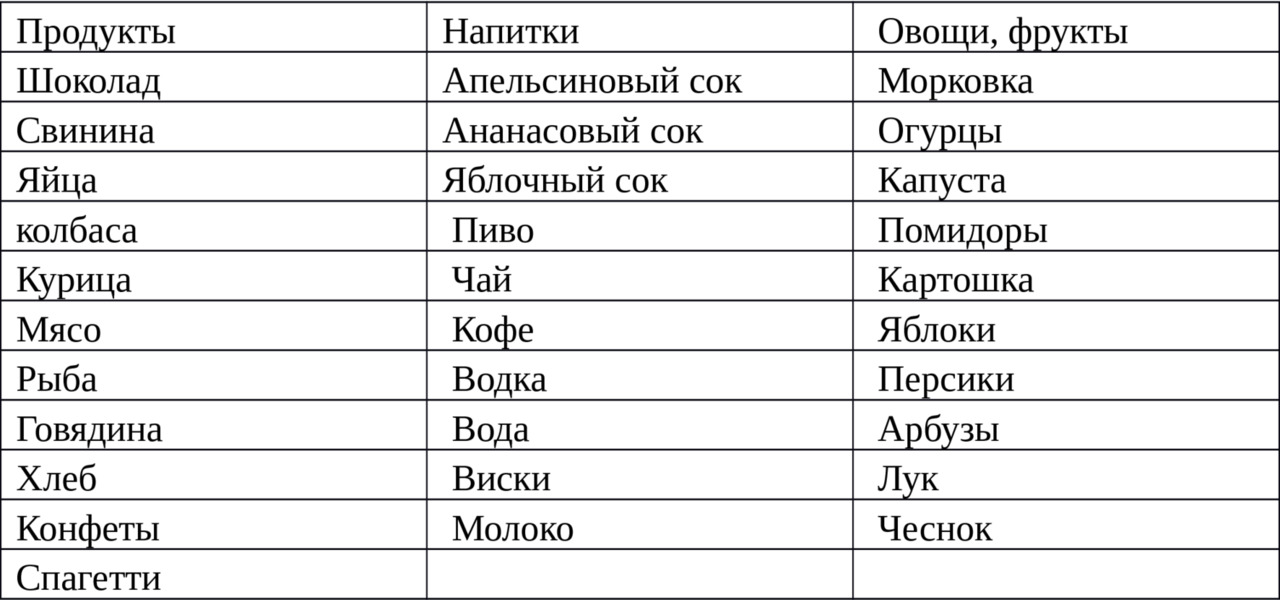
Memorize! ничего не (nothing) + a verb
For example: Я ходил в магазин, но ничего не купил. (I went shopping, but I bought nothing.)
Бесплатный фрагмент закончился.
Купите книгу, чтобы продолжить чтение.